|
|
|
Sort Order |
|
|
|
Items / Page
|
|
|
|
|
|
|
| Srl | Item |
| 1 |
ID:
128428
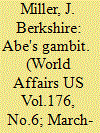

|
|
|
|
|
| Publication |
2014.
|
| Summary/Abstract |
China's aggressive actions in the East China Sea, combined with other factors, especially North Korea's continuing intransigence, have created an increasingly hostile security environment for Japan. Its response to these events can be seen in the impressive political rebirth of Shinzo Abe and the Liberal Democratic Party. While Abe, currently serving as prime minister for a second time, was elected largely because of his economic policies and the ineptitude of the formerly ruling Democratic Party of Japan, he has used his mandate to press forward with long needed, albeit controversial, defense and security reforms that indicate the seriousness with which Tokyo takes its current situation. With China looming up in front of them, and Pyongyang posing lesser but still worrisome threats, the Japanese have become acutely aware of the fact that their Self-Defense Forces (SDF) have one hundred and forty thousand ground troops, one hundred and forty-one maritime vessels, and four hundred and ten aircraft, while China's People's Liberation Army has one million six hundred thousand troops and North Korea has one million soldiers. Meanwhile, North Korea maintains a significant, if decaying, navy and air force, with one hundred and ninety vessels and approximately six hundred aircraft. China's much more capable maritime and air assets include nine hundred and seventy vessels and two thousand five hundred and eighty aircraft.
|
|
|
|
|
|
|
|
|
|
|
|
|
|
|
|
| 2 |
ID:
128389
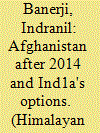

|
|
|
|
|
| Publication |
2011.
|
| Summary/Abstract |
Current speculation on the future of Afghanistan revolves around 2014, the year US forces are supposed to finally end their Afghan War mission. The key question is what will happen once the Americans depart? What sort of Afghanistan would emerge after that? Would the Taliban once again overrun that country and establish a ruthless Islamic emirate? Or would the pro-West regime in Kabul survive with the aid of the fledgling Afghan National Army and police? And where would all that leave India?
|
|
|
|
|
|
|
|
|
|
|
|
|
|
|
|
| 3 |
ID:
170498
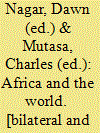

|
|
|
|
|
| Publication |
Switzerland, Palgrave Macmillan, 2018.
|
| Description |
xxxiv, 520p.: figures, tableshbk
|
| Standard Number |
9783319625898
|
|
|
|
|
|
|
|
|
|
|
|
Copies: C:1/I:0,R:0,Q:0
Circulation
| Accession# | Call# | Current Location | Status | Policy | Location |
| 059817 | 327.6/NAG 059817 | Main | On Shelf | General | |
|
|
|
|
| 4 |
ID:
133777
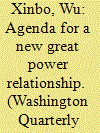

|
|
|
|
|
| Publication |
2014.
|
| Summary/Abstract |
Well begun is half done," Aristotle once said, meaning that beginning a project well makes it easier to do the rest. Yet, this may not be true of China-U.S. relations during Obama's presidency. Although the Obama administration secured a smooth transition from the George W. Bush years and attached high priority to relations with China during its first year in office, bilateral relations turned downward over the rest of Obama's first term, leaving a legacy of growing mutual suspicion and rising competition between the two countries, especially in the Asia-Pacific region. In spite of the November 2009 bilateral agreement to build a "positive, cooperative, and comprehensive relationship,"1 the two sides missed opportunities for more cooperation while mishandling and even misguiding bilateral ties on some points.
|
|
|
|
|
|
|
|
|
|
|
|
|
|
|
|
| 5 |
ID:
126774
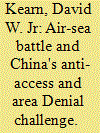

|
|
|
|
|
| Publication |
2013.
|
| Summary/Abstract |
The challenge presented by china's military modernization has seemingly altered the conventional balance in the western pacific, with significant implications for U.S. national security policy, and, thus, deserves the focus of planners and decision-makers.
|
|
|
|
|
|
|
|
|
|
|
|
|
|
|
|
| 6 |
ID:
127061
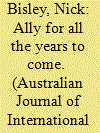

|
|
|
|
|
| Publication |
2013.
|
| Summary/Abstract |
In 2011, Australia communicated a clear choice about its strategic future. It would continue to cleave tightly to the US alliance, expand its military links and work to advance the USA's conception of regional order. Given its economic interests, why has Australia bound itself to the US alliance? What lies behind this strong commitment and what would it take for Australia to change its relationship with the USA? This article presents an analysis of the current state of the US-Australia alliance and argues that Canberra's pursuit of close relations with the USA reflects the interaction of a rational calculation of the costs and benefits of the alliance with a set of resolutely political factors that have produced the current policy setting. The article first assesses the security cost and benefit behind the alliance. It then argues that the move also derives from the strong domestic support for the US alliance, a sharpened sense that China's rise was generating regional instability that only the US primacy could manage and the realisation that the economic fallout of such a move would be minimal. It concludes with a brief reflection on what it might take to change the current policy settings.
|
|
|
|
|
|
|
|
|
|
|
|
|
|
|
|
| 7 |
ID:
125036


|
|
|
|
|
| Publication |
2013.
|
| Summary/Abstract |
THE THOUSAND-YEAR HISTORY of cooperation and opposition, alliance and hostility, the tragedy of the two world wars, and the decades of bloc confrontation have united the fates of Russians and Germans. Their common past has become a solid foundation for developing bilateral relations that have long gone beyond the framework established by political expediency and economic efficiency. Our interaction has acquired a unique humanitarian dimension that penetrates and cements it at all levels and in all spheres, reflecting its mature and strategic nature.
|
|
|
|
|
|
|
|
|
|
|
|
|
|
|
|
| 8 |
ID:
062467
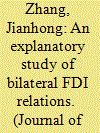

|
|
|
| 9 |
ID:
062197


|
|
|
|
|
| Publication |
Spring/Summer 2005.
|
|
|
|
|
|
|
|
|
|
|
|
|
|
|
|
| 10 |
ID:
077393
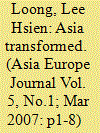

|
|
|
| 11 |
ID:
125091
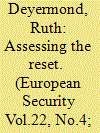

|
|
|
|
|
| Publication |
2013.
|
| Summary/Abstract |
Critics of the Obama administration's 'reset' with Russia claim that it has failed to improve bilateral relations and has conceded too much to Russia at the expense of American interests. In fact, the reset has delivered significant improvements in key areas and established the institutional basis for continued cooperation in the future, benefiting both states. Although disagreements remain on several important issues including missile defence, humanitarian intervention, and democracy, the reset has been broadly successful on its own terms, which were always limited in scope and based on a pragmatic recognition of the limits of possible cooperation. Future progress is uncertain, however - obstacles include differences of national interest; the complicating effects of relations with third party states and the impact of domestic politics. A continuation of the pragmatic approach underpinning the reset represents the best chance for stability in the US-Russia relationship.
|
|
|
|
|
|
|
|
|
|
|
|
|
|
|
|
| 12 |
ID:
178744
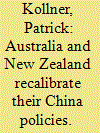

|
|
|
|
|
| Summary/Abstract |
Australia and New Zealand (NZ) have in recent years been at the forefront of the growing confrontation between the ‘West’ and China. Despite very close economic ties with China, both countries have substantially changed their approaches to dealing with the People’s Republic. In this article, I take stock of and compare the Australian and NZ recalibrations of their respective China policies, highlighting similarities as well as differences across the two country contexts and over time. It was Australian federal state actors who first embarked on a major ‘reset’ of China policy, culminating in legislation on espionage and foreign interference in 2018. After a change in government, state authorities in NZ appeared to follow Australia’s lead. However, NZ’s adjustment of its China policy has been less straightforward, more contested and overall more ambiguous. Small-state theories partly explain NZ’s more ambivalent approach. A more comprehensive understanding can be gained by reference to how NZ differs from its Tasman neighbour in terms of strategic outlook, including the paramount importance accorded to trade in its foreign affairs.
|
|
|
|
|
|
|
|
|
|
|
|
|
|
|
|
| 13 |
ID:
130176
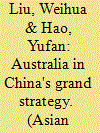

|
|
|
|
|
| Publication |
2014.
|
| Summary/Abstract |
This paper examines China's strategic interests in Australia. From the security per- spective, Beijing hopes that Australia will be a constructive factor for its peaceful rise. On the economic side, Beijing hopes that the bilateral relationship will ensure sufficient and sustainable resources and energy supplies from Australia for China's domestic needs
|
|
|
|
|
|
|
|
|
|
|
|
|
|
|
|
| 14 |
ID:
131665
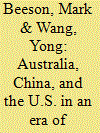

|
|
|
|
|
| Publication |
2014.
|
| Summary/Abstract |
Tensions in the Asia-Pacific region are rising as a consequence of the U.S. "pivot" to Asia and China's increasingly assertive foreign policy. Other states in the region must try to reconcile potentially conflicting economic and strategic imperatives as a consequence. Australia illustrates these dilemmas. We ask what role regional institutions can play.
|
|
|
|
|
|
|
|
|
|
|
|
|
|
|
|
| 15 |
ID:
127343
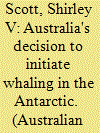

|
|
|
|
|
| Publication |
2014.
|
| Summary/Abstract |
On May 31, 2010, Australia instituted proceedings before the International Court of Justice in the case of Whaling in the Antarctic (Australia v. Japan). Although Australian politicians had for some time threatened such a course of action, the decision to proceed with international litigation took many observers by surprise, most basically because Japan appeared to be in a strong legal position and the risks associated with the case appeared greater than Australia's prospects for success. This article examines the background to the whaling dispute and suggests two ways in which litigation in the World Court may contribute to resolution of the dispute no matter the legal outcome of the case.
|
|
|
|
|
|
|
|
|
|
|
|
|
|
|
|
| 16 |
ID:
128435
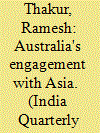

|
|
|
|
|
| Publication |
2013.
|
| Summary/Abstract |
The ebb and flow of coping with Australia's identity dilemma as a European settler society located on the geographical edge of Asia leads to bouts of agonising, excitement and temporising. This has been given particular cogency with the power shift underway from the trans-Atlantic to the Asia-Pacific. The 2012 White Paper set 25 national objectives to be met by 2025, with targets ranging from improving trade links and increasing scholarships to teaching priority Asian languages. But in this transactional embrace of Asia that highlights economic and trade links, gaps might open up between ambition and delivery, especially amidst continuing evidence of insensitivity to how Asians forge lasting relationships. Ties with China are dominated by trade but security concerns remain. Relations with India should improve with the removal of the nuclear issue as an irritant and growing trade and tourist numbers. Japan remains an important trade and diplomatic partner. And geography and demography ensure that Indonesia is no less important to Australia than Asia's big three.
|
|
|
|
|
|
|
|
|
|
|
|
|
|
|
|
| 17 |
ID:
131843


|
|
|
|
|
| Publication |
2014.
|
| Summary/Abstract |
As relations between Japan and China change due to a paradigm shift that has occurred over the past few years, the need for a new security outlook and world view has emerged. In East Asia, the foundation for the relationship between Japan and China must be fairness and justice, and the rule of law. This article proposes ways that Japan and China can work to cultivate common ground that would bring forth the possibility of a new Japan-China relationship based on the "strategic reciprocal relationship" established in 2006.
|
|
|
|
|
|
|
|
|
|
|
|
|
|
|
|
| 18 |
ID:
134134
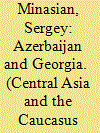

|
|
|
|
|
| Publication |
2014.
|
| Summary/Abstract |
The relations between Georgia and Azerbaijan are a key factor in regional politics and security in the Southern Caucasus. They strongly affect economic contacts and trade, as well as the implementation of all sorts of communication and energy projects. The two countries agree on many issues of regional policy, the way ethnopolitical conflicts should be settled, and the degree to which external actors could or should be involved. Turkey's presence in bilateral Georgian-Azeri relations is another important factor that may end in a geopolitical triangle of sorts in the Southern Caucasus. On the other hand, these relations cannot and should not be described as a formalized full-scale political, let alone, military-political alliance with corresponding mutual obligations. The author discusses these and other aspects of bilateral relations, assesses the prospects for further cooperation, and points to the possible challenges and problems that might crop up later.
|
|
|
|
|
|
|
|
|
|
|
|
|
|
|
|
| 19 |
ID:
118502
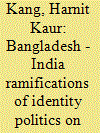

|
|
|
| 20 |
ID:
109057
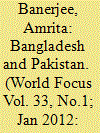

|
|
|
|
|
|
|
|